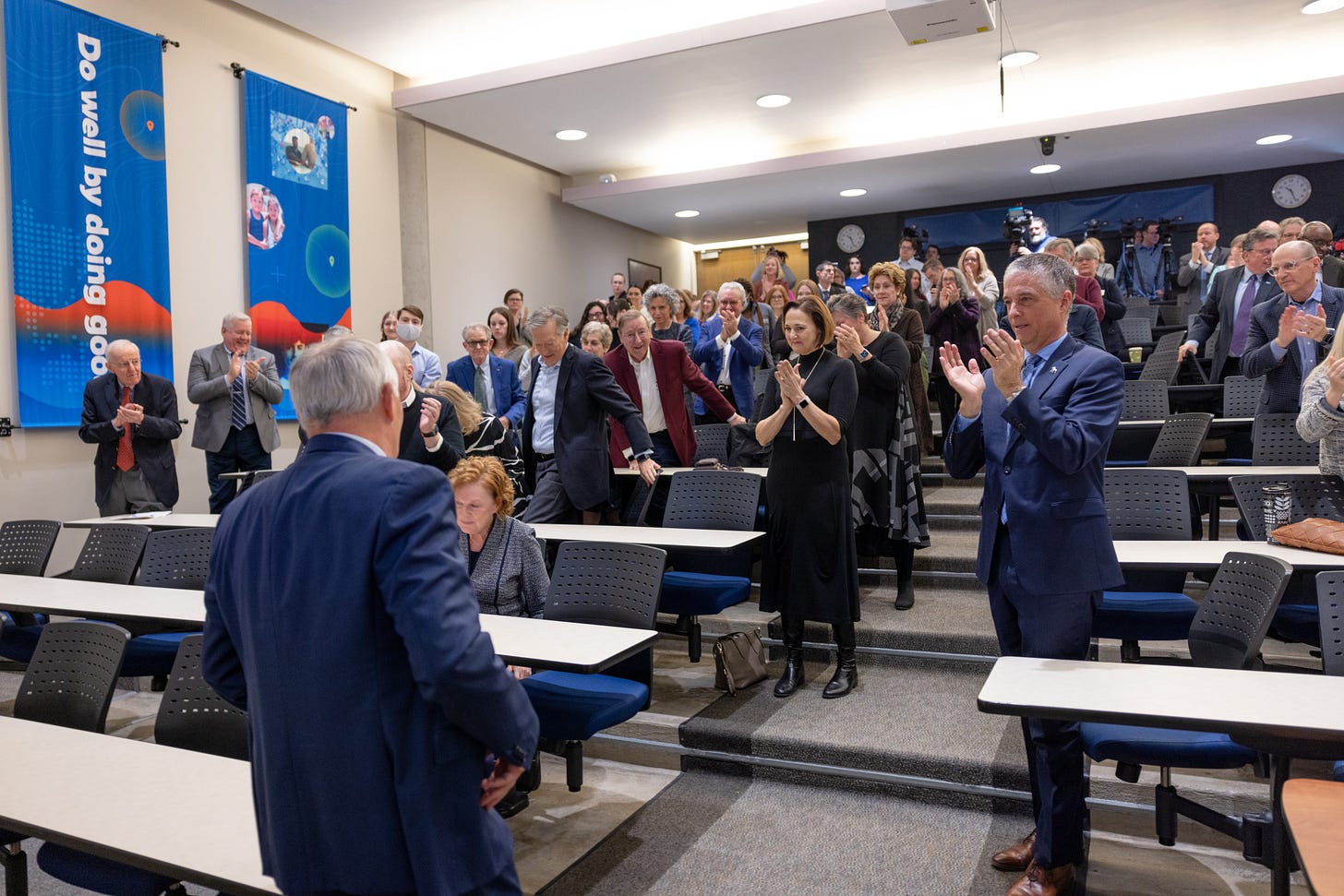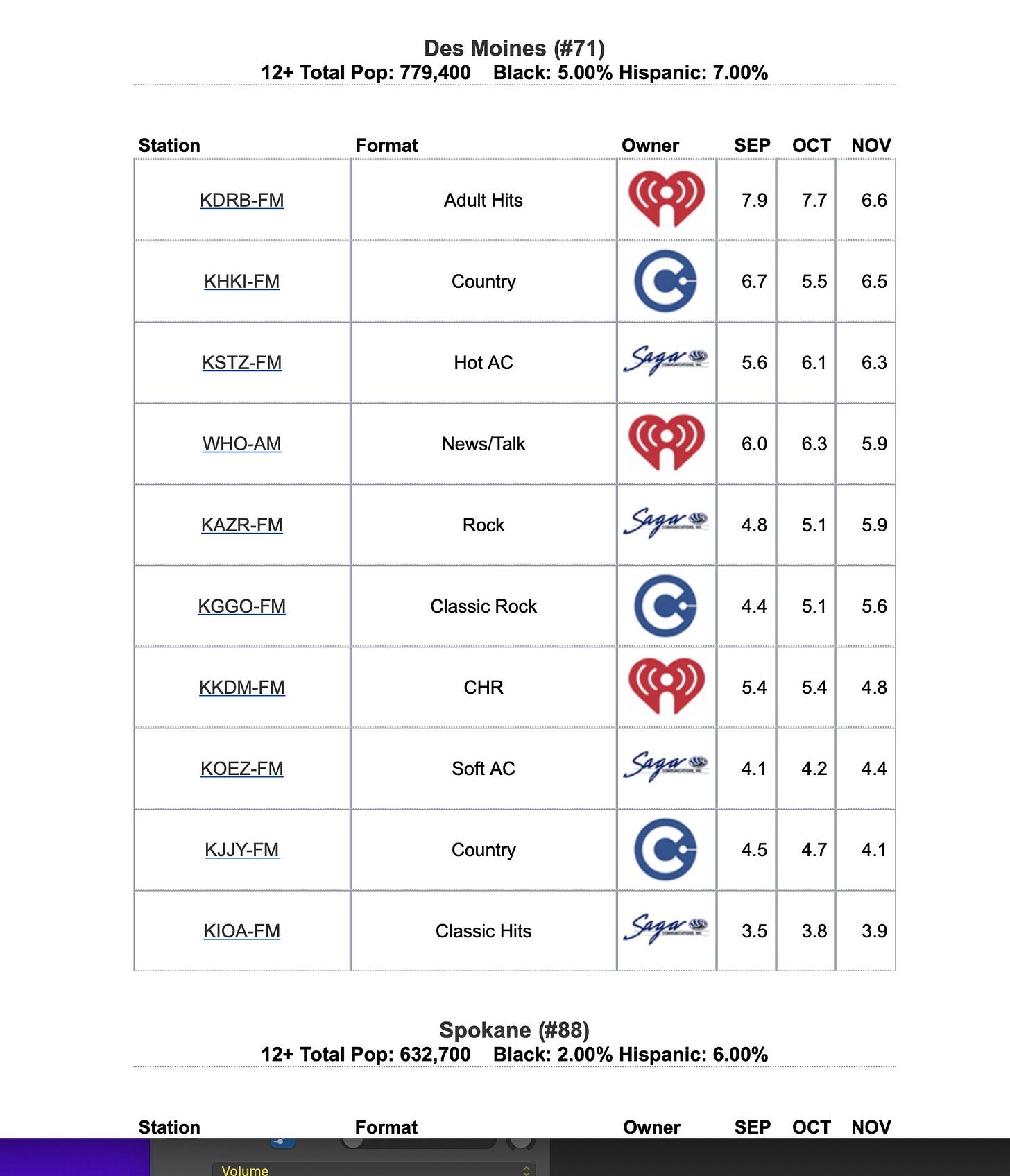Futurist David Houle, Monday Zoom Lunch guest podcast from March 6.
Coming Monday, March 13
Our upcoming Monday Zoom guests are Larry and Kathi Zimpleman, and Alejandro Hernandez, dean of the Zimpleman College of Business. The link to the discussion: https://us02web.zoom.us/j/82681542348. What does the mission, do well while doing good, mean to them? Join us, Monday, March 13, at noon central time.

The Future
Last Monday, we learned much from our guest, futurist David Houle, including the politically correct term to replace the identifier ‘middle man.’ Listen to our discussion and if the topic interests you (and why wouldn’t you be interested in future trends?) subscribe to his column: David Houle Evolution Shift.
As for ‘evolving,’ the Monday Zoom Lunch conversations are growing into a podcast that listeners are tuning into. The audience participants are smart, engaged, informed, and as interesting individually as the speakers. And, because of this culture and the technological ability to upload the hour-long discussion into podcast form, we’re gaining a couple of hundred new listeners with each session.
This is all part of our ‘why’ in this stage of life. These sessions are sparking new connections and ideas.
One friend in St. Petersburg, Florida became excited about what Houle had to say about repurposing ‘ghost’ retail space. He serves on nonprofit boards and thinks there is real merit to the idea. Most initiatives begin in conversations, just like we had on Monday. Our horizons and opportunities expand when we get out of our invisible silos of news and information. It keeps us young. Engaged. Evolving.
Tell a friend. Invite them to join us. That’s how we grow.
Tidbits
In two past columns, I asked about current radio station Nielsen ratings and reported the IPR story saying Iowa is ranked second (SECOND!) in cancer diagnosis.
How could Iowa be ranked above every state in the union except Kentucky (known for tobacco, Bourbon, Mitch McConnell, and Rand Paul)?
Two retired physician readers responded:
Scott Helmers, Spirit Lake, IA:
I noted that you highlighted the discouraging Iowa cancer statistics. I might share some physician thoughts, for no good reason other than I tend to be a wordy person.
Cancer statistics for populations are notoriously fraught and difficult for attribution. The variables, both known and unknown, may be legion. Incidence and death rates may diverge. Sometimes, for a small area with a known toxic exposure, a tentative conclusion might be drawn. For an area as large as a state, a specific cause or causes would be extremely uncertain.
First, nearly all cancers have their origins some years past. And research is identifying genetic factors as paramount in nearly all malignancies, both ancestral heritable genes, and some de novo mutations for which there might be some personal or environmental exposure. Smoking and other tobacco use are a famous examples of the latter. But greater numbers of cancers might possibly be simply due to the genetic heritage of the population.
Then, lifestyle factors, such as heavy alcohol use or diet or lack of exercise may be blameworthy. Certain cancer causing viral infections such as HPV are very well defined, and so refusal to be immunized or to be cautious might be in play.
Cancer statistics allow the general public their cognitive biases to nominate their favorite villains. True cancer researchers would be the last to name factors.
Undoubtedly, some in Iowa will insist the cause is agricultural chemicals. To blame the farming community, however, one would have to show that more chemicals are used in Iowa than other farming states. It would have to be shown that the water and air have residues in greater quantities that in other farming states, and the cancer incidence would have to be shown to vary within the state by local conditions.
Lifestyle factors such as obesity could be important, but that factor would disappear if states with similar obesity had far lower rates. Are circumstances of despair such as heavy alcohol use greater in Iowa?
Health consciousness and behaviors do vary along political lines. As Iowa has become more right wing and unwelcoming, has Iowa been abandoned by persons more likely to take care of themselves? With decrease in health consciousness has screening decreased? Less screening might temporarily lower incidence, but then it would catch up later with a jump when those missed cancers start appearing. Perhaps it is just the population remaining in Iowa today with all their various characteristics.
It may not be impossible to identify causes for more cancers in Iowa, but by no means can quick definitive conclusions be drawn. There may be a multitude of factors impossible to separate. I hesitate to draw any specific or simple conclusion. It is, however, nothing of which Iowa can be proud.
Scott
And this from Bob Shreck, retired Oncologist:
When I got your email I thought I had a short list of reasons and risks that would account for Iowa's poor standing:
1. Median age. Cancer is largely a disease of the elderly, and when I was in medical school, the word was that we had the second oldest population in the USA. However, when I look this up, we are in the middle of the median state age.
2. Smoking. At one time 40% of patients referred to us would never have had to come if they had never smoked. Lung, oropharynx, esophagus, kidney, and bladder cancers are all closely linked to sustained cigarette smoking. However, Iowa is right there at the USA average in current smokers, around 16%. It may be that we had, at one time, a higher incidence of long-term smokers as the risk never really goes away even if you stop--it just stops climbing--but I could find no data on this.
3. Obesity, is the fourth most significant risk factor for cancer, especially breast, uterus, and colon. However, we are right there in the middle of the obesity epidemic incidence in the USA at about 40%.
4. Alcohol. Here we do have a significantly elevated alcohol intake when compared to the national average, so this is likely one factor, but certainly not enough to account for our star ranking.
5. Data gathering. Iowa has been a designated SEER site since the program's inception 50 years ago. The SEER program makes cancer a legally-reportable disease, and the data is accumulated nationally from about 22 sites. Iowa represents a "rural" population. Given our long history with the program, it may be that we do a better job of capturing all our cancer diagnoses. This is speculation on my part and even if true would not account by itself for our high ranking.
I read the entire report this evening, and all these factors are addressed (except #5), and the report concludes that the high incidence has no discernible cause(s).
Whatever the reasons, the elevated risk seems to come from our rural areas. What is there about life in a rural area that increases your chance of being diagnosed with cancer? Herbicides? Insecticides? Higher smoking/drinking incidence? Obesity? Water quality?
I don't have an answer but thanks for raising the question--I learned a lot looking into it.
Bob Shreck
Finally, my Iowa Writers’ Collaborative colleague, Art Cullen, penned his response to the dubious distinction:
Des Moines Radio Ratings
Iowa Business news podcaster, Michael Libbie, responded to my column about local radio station ratings by forwarding a recent Nielson report for the Des Moines metro market.
If you’re interested in commentary by some of Iowa’s best writers, please follow the Iowa Writers’ Collaborative members:
Laura Belin: Iowa Politics with Laura Belin, Windsor Heights
Doug Burns: The Iowa Mercury, Carroll
Dave Busiek: Dave Busiek on Media, Des Moines
Art Cullen: Art Cullen’s Notebook, Storm Lake
Suzanna de Baca Dispatches from the Heartland, Huxley
Debra Engle: A Whole New World, Madison County
Julie Gammack: Julie Gammack’s Iowa Potluck, Des Moines and Okoboji
Joe Geha: Fern and Joe, Ames
Jody Gifford: Benign Inspiration, West Des Moines
Nik Heftman, The Seven Times, Los Angeles and Iowa
Beth Hoffman: In the Dirt, Lovilla
Dana James: New Black Iowa, Des Moines
Pat Kinney: View from Cedar Valley, Waterloo
Fern Kupfer: Fern and Joe, Ames
Robert Leonard: Deep Midwest: Politics and Culture, Bussey
Tar Macias: Hola Iowa, Iowa
Kurt Meyer, Showing Up, St. Ansgar
Kyle Munson, Kyle Munson’s Main Street, Des Moines
Jane Nguyen, The Asian Iowan, West Des Moines
John Naughton: My Life, in Color, Des Moines
Chuck Offenburger: Iowa Boy Chuck Offenburger, Jefferson and Des Moines
Barry Piatt: Piatt on Politics: Behind the Curtains, Washington, D.C.
Macey Spensley, The Midwest Creative, Davenport and Des Moines
Mary Swander: Mary Swander’s Buggy Land, Kalona
Mary Swander: Mary Swander’s Emerging Voices, Kalona
Cheryl Tevis: Unfinished Business, Boone County
Ed Tibbetts: Along the Mississippi, Davenport
Teresa Zilk: Talking Good, Des Moines
The Iowa Writers Collaborative is also proud to ally with Iowa Capital Dispatch.














Share this post